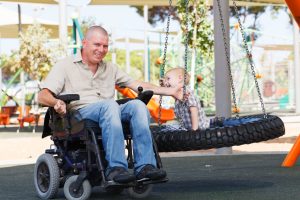A serious injury sustained as a result of a road traffic collision can change both the life of the injured person and the lives of those around them.
Serious injuries can result in a disability of some kind and the injured party will often need rehabilitation to learn to use injured or damaged muscles again.

The rehabilitation process can be physically tough and emotionally draining. Voice is here to help whatever you’re feeling and regardless of if you are the person who has been directly injured or not.
Rehabilitation and treatment
Where serious injury is incurred, a rehabilitation programme may continue for months or in some cases even years.
Towards the end of your stay in hospital your short-term and long-term needs will be assessed. A rehabilitation programme will be put together which may include medical treatment as well as addressing practical needs at home and in the workplace.
If you are pursuing a compensation claim this can help you access additional treatment and practical support.
The treatment a person will receive will obviously depend on the nature of the injury, but can include work with:
- physiotherapy – used to improve or restore – if possible – a person’s mobility and independence. Physiotherapists use techniques such as strengthening exercises and manual therapy;
- psychologists and neuropsychologists – these clinicians provide assessment and therapy for people with head injuries; and
- speech and language therapists – who work to improve a person’s communication skills. This may include understanding and expressing both written and spoken language, and improving speech clarity. They can also help people who have difficulty swallowing.
Help at home
An occcupational therapist will assess your level of physical functioning and will put together a programme that aims to assist you to regain as much independence and lifestyle as possible.
This programme will depend on the extent of your injury and resulting disability; whether you live with your family or alone, and the type of house you live in.
If your injury results in mobility issues, ramps or wider doorways may need to be installed in your home. Occupational therapists can also provide information and support to your carer(s) aswell.
If you are recovering from your injury or permanently disabled, you may also need a care assistant, or full-time help from a family member, to enable you to continue living at home.
Help at work
If your accident has left you with long-term disabilities you may be able to return to your previous job. This may require changes to your workplace, such as an installation of a ramp for a wheelchair user.
If you’re unsure of your rights, contact us.
Advice on working with a disability can be obtained from a Disability Employment Adviser (DEA) at your local Job Centre. The DEA can also provide information about a range of different schemes to help you return to work.
Transport and getting around
If an injury leave you with mobility issues, there are a range of public transport options available to help, including wheelchair-friendly buses and trains.
Some regions also operate minibus facilities specifically for people with mobility issues.
If you have a disability but want to drive a car it is important that you inform the Drivers Medical Group of the DVLA (Driver and Vehicle Licensing Agency) of any injury that may affect driving.
This includes impaired limb function, certain visual disorders and head injuries that required treatment for more than one day in hospital. The DVLA will then, with your permission, seek information about your fitness to drive from your GP or hospital consultant.
Following assessment of your case it will decide whether or not you are fit to drive. It may add special conditions to your licence. For more information about driving after an injury go to the DVLA website.
Help from friends and neighbours
It can take you a long time to come to terms with your new disabilities, and to adjust to any new way of life. In the meantime, it’s important that you access help and support, so you can continue to do the things you need to do, and also ensure you don’t rush your rehabilitation.
Friends and neighbours will often be willing to help in any way they can, so ensure you ask them for help if you need it.
